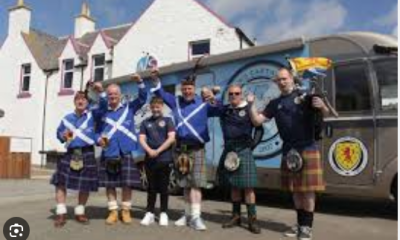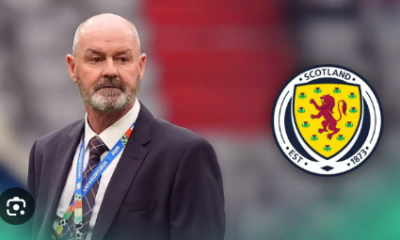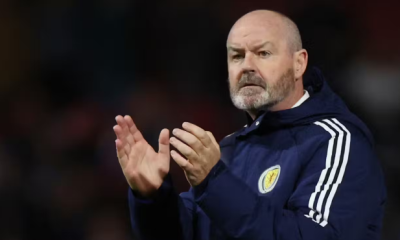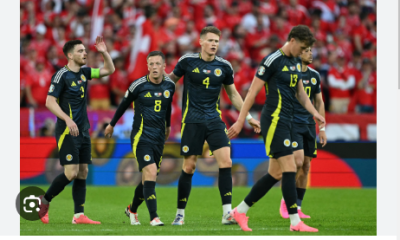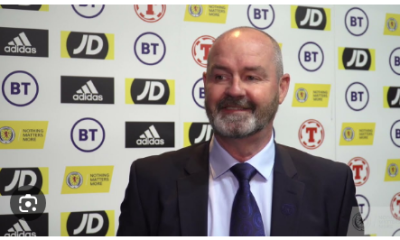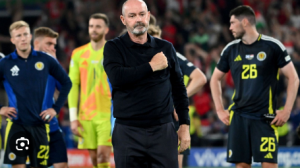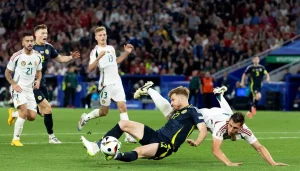Scotland National
Scotland and Tartan Army gain admiration from Germany fans

Germany is being overtaken by the Tartan Army. Travelling by land, sea, and air to support their country’s football team in the European Championships are thousands of Scottish football fans, who are well-known for their boisterous good behaviour.
After flying to Cologne to play Switzerland and Stuttgart to play Hungary in the final group game, Scots will assemble in Munich for the inaugural meeting against the host country.
The Scottish national squad has already left a lasting impression even before the competition officially began.
The team was greeted with cheering children flying the saltire when they arrived at their training camp in Garmisch Partenkirchen.
Scenes featuring Scottish actor John McGinn interacting with Lederhosen-wearing Bavarian dancers were featured on national television and have received over a million views on social media. There are welcome to Scotland posters hanging on the lampposts.
“Kicker,” a must-read German football journal, also reported on the arrival: Germany’s first opponents at the European Championship The fans who had already arrived in Garmisch-Partenkirchen cheered loudly as Scotland arrived. Elisabeth Koch, the mayor of the municipality, along with bagpipers and a band welcomed national coach Steve Clarke’s team prior to the opening game on Friday in Munich. Andy Robertson, a star for Liverpool, stated, “It was a warm welcome.”
At the base of the Zugspitze mountain, the Scots settle into their base. The Tartan Army’s strong influence was evident as soon as they arrived, and over 100,000 Scottish fans are anticipated to attend the competition. Koch called the team’s arrival in the city “great.”
Scotland’s remarkable qualification run, which featured 3-0 wins over Cyprus, 2-0 against Spain, 2-1 against Norway, and 2-0 against Georgia, has been covered by the German media as “exciting.” It is also noteworthy that there was a 12-1 goal differential in the five consecutive victories.
Many people are tracking the progress of Paisley charity fundraiser Craig Ferguson, who has been walking from Scotland to Germany in order to raise thousands of pounds for men’s mental health and suicide prevention, as the Euros get closer.
He is almost at the £40k mark on a stretch goal of £50k, having previously surpassed an initial fundraising goal of £10k for the mental health charity Brothers In Arms.
Craig has been travelling across six nations in ideal time for his 37-day charity walk, making friends, donors, and admirers along the process.
Craig received the wonderful news that he had been granted a ticket to the opening game in Munich not long after entering Germany.
To contribute to Craig’s charitable endeavour, go to “Just Giving” on the internet and search for the “Craig Ferguson Glasgow to Munich Charity Walk.” Kindly make a significant donation.
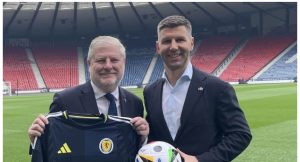
Germany is already gaining followers for Scotland and the Tartan Army. It’s wonderful to see fans of both nations getting along so well, as a half-German Scot.
Although I would prefer for both Germany and Scotland to go to the next round, I will be rooting for Scotland to win.
Scotland’s open football philosophy has been commended by Germany, the hosts of the European Championships, including former national team member Thomas Hitzlsperger.
This will be on display during the competition as the Tartan Army plays a significant role as outstanding representatives of Scotland.
Scotland National
Scotland boss gives update reason for teams success
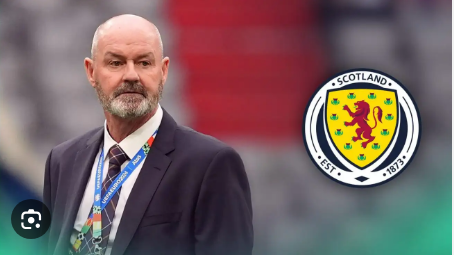
The Scots were left incensed when no spot kick was awarded after Stuart Armstrong went down under a challenge from Willi Orban.
Scotland
Fans send shocking messages to Tartan Army
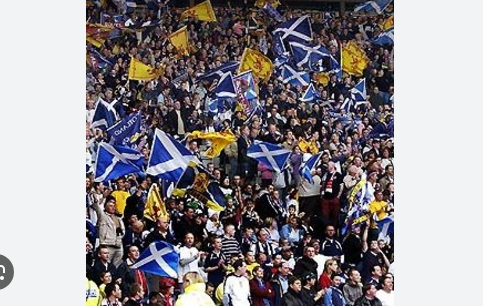
In anticipation of Scotland’s run in Euro 2024, a tourism director has referred to the Tartan Army as “fantastic ambassadors for Scotland” and expressed optimism that more tourists from host country Germany will travel to Scotland.
During Scotland’s participation in the tournament, over 200,000 Scottish supporters came to Germany to support their national side. VisitScotland, the nation’s tourism organisation, reported an 83% increase in website views from German users during this period.
14,925 German users were active on visitscotland.com between June 13 and June 23, up from 8,147 during the same period the previous year.
Pics of people wearing tartan Scotland fans cheering on their team in its first international competition since 1998 garnered international notice and were named the greatest supporters at this year’s tournament in a recent survey conducted by German media source RTL.
Malcolm Roughead, chief executive of VisitScotland, stated: “We firmly believe that the Tartan Army has served as outstanding representatives for Scotland and a tremendous source of support for our national side.
“Watching the scenes of Scotland supporters giving that iconic Scottish greeting and seeing such appreciation from the German supporters has been amazing.
We’ve seen a spike in German visitors to our website since the beginning of Euro 24, with visits nearly doubling over this time last year.
One of our most important international markets is Germany, where we spent £247 million and had 343,000 visits last year. According to our research, German tourists are drawn to Scotland because of its people, history, and landscapes—with Scotland supporters serving as a prime illustration of this.
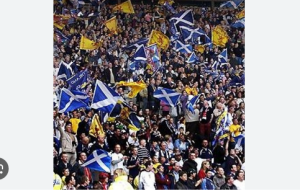
“We’ll keep fostering this interest through our marketing initiatives, such as our most recent campaign, which focuses on important west German cities with high visitor demand and good access to Scotland.”
Over the course of the tournament, up to two million people are anticipated to view the mobile digital advertising campaign, which attempts to market Scotland as the ideal retreat for those looking to replace the football drama with breathtaking landscape.
Scotland National
Scotland confirm Euro 2024 talks
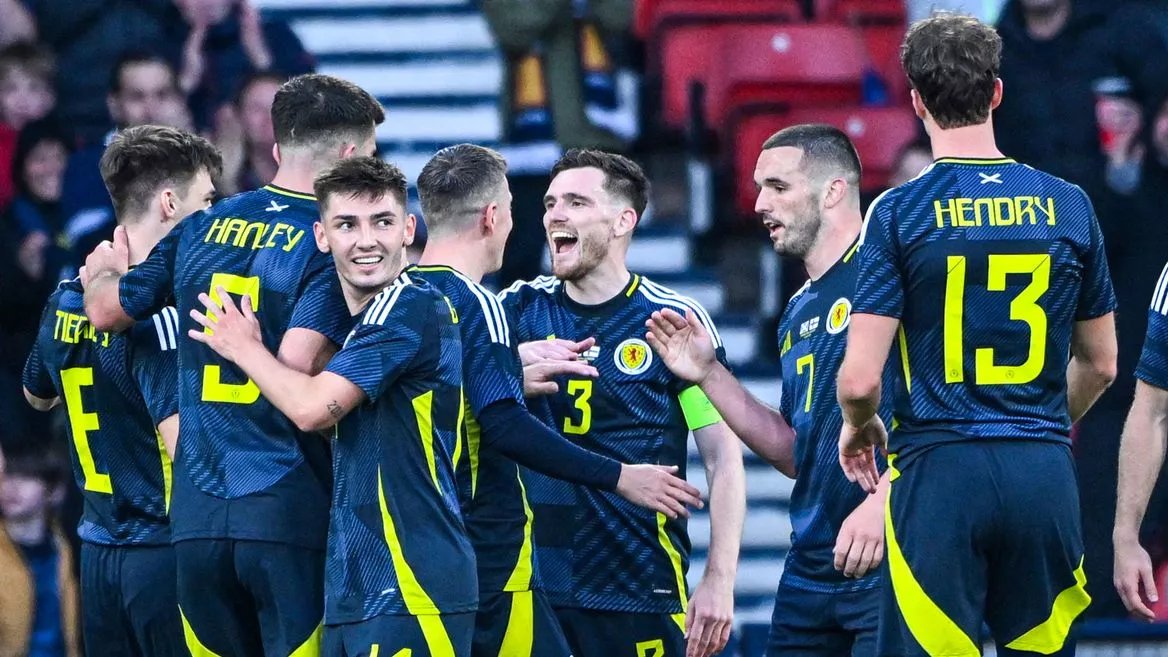
While some countries will be aware of the necessary outcome to rank among the top four third-place teams, others will not
Scotland and Hungary are tying late in the Stuttgart match on Sunday night. Scotland would place third in their group as a result of the outcome. Would that, however, imply that Scotland go on to the European Championship’s second round? Scotland is in the dark.
Scotland’s hopes of making it to the second round of the European Championship were severely diminished when they were placed in Group A. When, not who, Scotland would face, was the issue.
The first group to be finished is group A. If Scotland wins or draws with Hungary on Sunday night, they would finish third in their group, but it is unknown if this will be enough to get them to the round of 16.
It captures the ridiculousness of the European Championship. It matters more than just who teams you are matched up against. What letter your organisation is also matters.
The fairness of sports depends on the principle that all teams must abide by the same rules. This is why doping, bribing opponents or referees or, indeed, breaching Financial Fair Play rules distort the entire competition.
Sporting integrity also depends upon symmetry of information – the idea that all teams must have equal knowledge about what the outcomes of results could be. Matches are played out in unison on the final day of each league season to prevent the sides that play last from having an unfair advantage.
Yet this principle does not apply to the 24 teams at the European Championship. Sixteen teams proceed to the second round – the top two in each group, and four of the six best third-placed sides, a process that sacrifices sporting integrity.
In two previous editions of the 24-team Euros, one winner owed their victory in part to being drawn in group F. In 2016, after draws with Iceland and Austria in their opening two matches, Portugal knew that another draw, against Hungary, would be enough to squeeze into the last 16 in third place. When the score was level at 3-3, Portugal could be content, guaranteed that such a score would send them through; Hungary, who were on course to win the group in the event of a draw, had no need to press for a goal either.
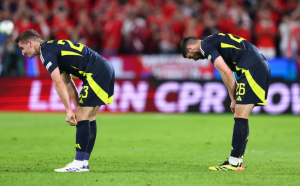
Had Portugal’s game been in group A, their calculation would have been very different. A draw would have left Portugal on three points – at risk of four other third-placed teams finishing on more points, thereby eliminating them. Perhaps Portugal would have accepted their fate being in the hands of others. But perhaps this fear would have Portugal to attack recklessly in the last throes of the game, risking conceding another goal and tumbling out of the competition.
Portugal was spared these unpleasant options because they were in group F. They were in group F again at Euro 2020, drawing their final group match to secure a third-place qualification. Portugal finds themselves, as if by destiny, back in group F for Euro 2024.
History demonstrates how a team’s chances of qualifying are increased when they are in the final group to play their matches. In addition to two European Championships, the 16-out-of-24 qualification methodology was applied to three World Cups (1986–1994). A third-placed team from the last group to play has advanced in each of the five of these tournaments.
The structure makes it more likely for teams to collude, even covertly. According to Alex Krumer, a professor of sports economics at Molde University College, “both teams might benefit from a draw if the final group stage game is between the teams that have one win and one loss in the first two rounds.”
As third-place teams advance, there’s a chance something like the Disgrace of Gijón in 1982 may happen. In the last group match, West Germany and Austria knew that if West Germany won 1-0, Algeria would be eliminated and they would both advance. After West Germany took the lead early on, neither team really bothered to try to score again. The outcome was as expected.
The oddity of third-placed teams qualifying will continue to shape the Euros even after the knockout phases kick off. Two of the six group winners must play the runners-up, but the other four get the benefit of playing the third-place teams, who are probably inferior. Krumer claims that because of these “unbalanced brackets,” “the elimination stage is unfair.”
Fans are among the other victims of the labyrinth regulations. If Scotland finishes third in Group A, they will find themselves in a strange kind of sports purgatory. Scotland will be waiting on the results in other groups for the next 72 hours, neither in nor out of the competition. Supporters who are organising visits for the knockout stages are similarly left in the dark about which games they might see due to the format’s opacity. The winner of group B will play the third-placed team from either group A, D, E, or F in this year’s second round.
-

 Rotherham United2 months ago
Rotherham United2 months agoCardwell in, McCart out: The dream start to Rotherham’s summer transfer window
-

 Lincoln City1 week ago
Lincoln City1 week agoCharlton Athletic agree contract deal with Lincoln City
-

 Featherstone Rovers2 weeks ago
Featherstone Rovers2 weeks agoFeatherstone Rovers Chairman’s claim
-

 Totton1 week ago
Totton1 week agoTotton Man found dead in stolen car
-

 Kilmarnock1 month ago
Kilmarnock1 month agoPolice close down Kilmarnock road this morning
-

 Wakefield Trinity3 weeks ago
Wakefield Trinity3 weeks agoWakefield Trinity boss statement to fans after Wembley experience
-

 Totton1 week ago
Totton1 week agoPolice found dead body of missing Totton woman
-
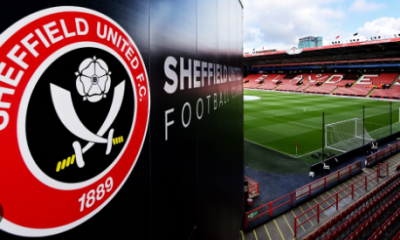
 Sheffield United2 months ago
Sheffield United2 months agoSheffield United welcome new experienced 27-year-old to the defence

